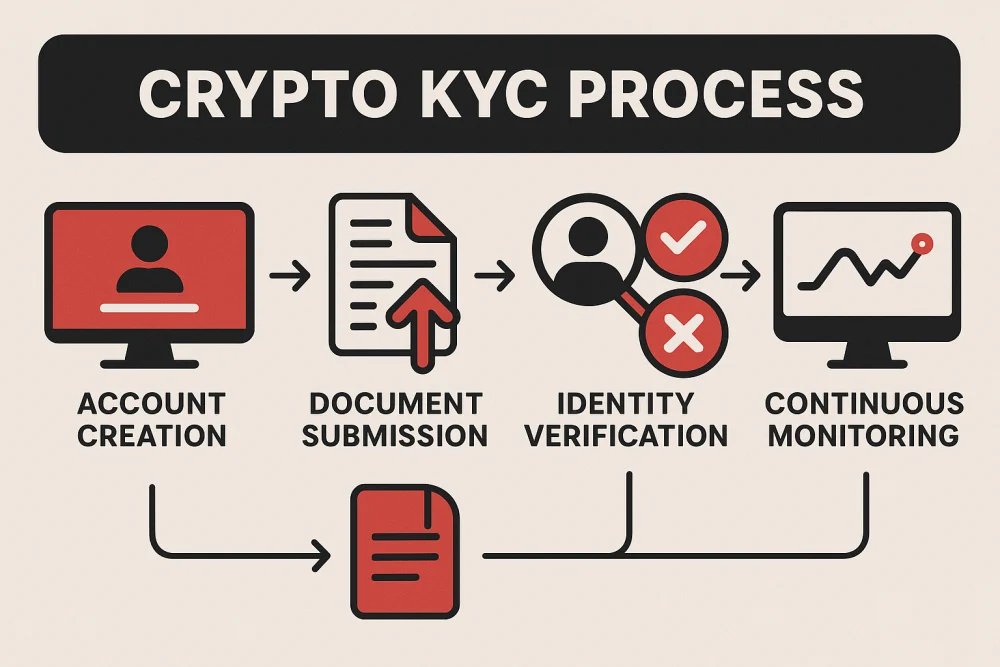Cryptocurrency has evolved from an experimental fad to a worldwide market. As it has grown in popularity, regulators around the world have made one thing clear: the platforms used to buy, sell, and store cryptocurrency have to know who their users are.
Know Your Customer (KYC) regulations, once the domain of traditional banks, are now applied to crypto exchanges, wallet providers, and even some DeFi projects.
In this article, we’ll break down what KYC means in the world of cryptocurrency, why it matters, and how it works in practice. We’ll cover the documents users need, the steps in the KYC verification process, the methods exchanges use, and the biggest challenges the industry faces. We’ll also look ahead at how technology and regulation are shaping the future of KYC in crypto.
What is KYC in Crypto?

KYC in crypto refers to the process of verifying a user’s identity before they’re allowed to trade, withdraw, or invest on a digital asset platform. Exchanges and wallet providers require users to provide documents such as a passport, driver’s license, or proof of address. They then verify and cross-reference this information against watchlists to ensure the individual is who they claim to be and is not using a fake or stolen identity.
The objectives are the same as in traditional banking, which is to prevent money laundering, fraud, and terrorist financing from entering the system. However, in the crypto world, these risks can present in new and complex ways. For example, recent investigations have exposed how Chinese chemical suppliers and Mexican cartels have used crypto transactions to sell fentanyl precursors, using pseudonymous wallets and decentralized exchanges to obscure the payment trail. Real-world cases like these are why rigorous KYC and ongoing risk monitoring are essential for crypto platforms.
One of the main differences between banks and crypto platforms is the scale and risk. Banks have been operating KYC programs for decades with face-to-face verification and well-established processes.
Crypto platforms, on the other hand, often onboard customers instantly from anywhere in the world, so they rely more on digital identity verification and automated screening. Criminal actors also view crypto as a means to move funds more quickly and across international borders, thereby increasing the risks for compliance teams.
This is where open-source intelligence (OSINT) tools, such as ShadowDragon Horizon™, can support compliance teams. By mapping connections between wallets, domains, and online identities, Horizon™ can expose the networks and infrastructure behind illicit transactions, such as those linked to fentanyl supply chains, cross-border laundering networks, or front companies used in China-Mexico trade corridors.
These insights extend beyond static identity document verification, helping institutions detect and disrupt emerging threats before they escalate. ShadowDragon also incorporates authorized signals from consumer payment platforms to trace recurring transaction activity and network relationships, using data-minimization practices and transparent source attribution.
Why is KYC Important in Cryptocurrency?

KYC is critical in cryptocurrency for four primary reasons:
Fraud Prevention
KYC helps prevent identity theft, account takeovers, and scams against users. By verifying account identities, exchanges can prevent malicious actors from using stolen credentials or transferring money to obscure their source.
OSINT tools like ShadowDragon Horizon™ strengthen this process by uncovering digital footprints, related aliases, or domain activity related to fraudulent wallets, enabling exchanges to detect identity misuse and account networks early.
Regulatory Compliance
KYC is at the center of numerous financial industry laws and regulations, including those from the Financial Action Task Force (FATF) and similar agencies, such as FinCEN in the U.S. and the UK’s FCA. An exchange that forgoes KYC can face fines, shutdowns, and be banned from key markets. KYC processes enable exchanges to monitor and report suspicious activity as necessary.
Open-source intelligence is increasingly used to meet FATF Recommendations 10 and 24 by identifying beneficial ownership, reputational exposure, and cross-border connections. ShadowDragon Horizon™ provides compliance teams with auditable, source-attributed data that supports regulatory filings and reduces investigative turnaround times.
Consumer Protection
User verification creates a more stable and trustworthy environment for users to trade and invest. Clients have more confidence knowing that their counterparty is a legitimate entity, which enables crypto platforms to prevent fraud or manipulation.
That trust is essential for retaining customers over the long term. By continuously monitoring open-source signals, such as social activity, domain changes, or adverse media, ShadowDragon helps exchanges detect emerging threats and preserve user trust without intrusive data collection.
Market Legitimacy
Institutional investors and payment providers will not work with platforms that don’t do KYC. KYC compliance demonstrates a commitment to combating financial crime and operating in accordance with global standards. That legitimacy is essential for helping crypto mature as a part of the financial system.
KYC Regulations in Crypto
The regulatory framework is driven by AML (Anti-Money Laundering) and CFT (Countering the Financing of Terrorism) laws. Global standards are established by agencies such as the FATF, while local regulators enforce these rules, including FinCEN in the U.S. and the FCA in the UK.
Open-source intelligence supports these AML and CFT frameworks by helping exchanges verify counterparties, map beneficial ownership structures, and trace transactional footprints that cross jurisdictions. Platforms using tools like ShadowDragon Horizon™ can demonstrate compliance with FATF Recommendations 10 and 24 through verifiable, source-attributed data.
The Travel Rule, which requires certain customer information to be shared between financial institutions, has recently been extended to cover virtual assets as well. These laws and regulations mean that crypto firms can no longer ignore KYC if they want to operate legitimately.
For centralized exchanges (CEXs), KYC is not optional. Regulators around the world have cracked down on exchanges that allowed users to transact assets anonymously. ShadowDragon monitors public blockchain activity alongside OSINT signals (e.g., domain ownership, aliases, social infrastructure) to inform centralized exchanges of high-risk wallets and associated entities prior to regulatory intervention.
DeFi platforms are also starting to feel the pressure. Once thought to be impossible to regulate, many DeFi projects are now experimenting with KYC layers in order to avoid being cut off from mainstream finance. And for ICOs (Initial Coin Offerings), strong KYC is now the bare minimum standard in order to avoid legal blowback and attract serious investors.
The Crypto KYC Process

KYC is generally a straightforward process for crypto users. Platforms have to verify identities, validate documents, and monitor accounts over time. The exact steps may vary from exchange to exchange, but the process generally follows these stages:
- Account creation. This involves signing up with an email address and providing basic personal information, such as a name and phone number. At this point, the account will often be limited in terms of functionality until it has been fully verified.
- Document submission. The platform will then require the customer to provide official documents for identity verification, typically a government-issued photo ID and a proof of address document. Some exchanges may also ask for proof of income sources if the customer is likely to make large transactions.
- Identity verification. This information is then checked against automated tools, which may include AI, optical character recognition (OCR), and biometric technology. Documents may also be manually reviewed by a compliance team. At this stage, OSINT tools such as ShadowDragon Horizon™ can enhance due diligence efforts by cross-referencing identity data against publicly available information (e.g., online aliases, domain registrations, social activities) to reveal any anomalies or red flags indicative of potential impersonation attempts that static checks may overlook.
- Approval or rejection. Verification can take anywhere from a few minutes to a few days to complete. The vast majority of rejections are due to blurry photos, expired documents, or mismatched details.
- Continuous monitoring. KYC doesn’t end once an account is approved. Exchanges perform ongoing monitoring to flag suspicious activity, unusual behavior, or new risks by re-screening customers against updated sanctions and Politically Exposed Persons (PEP) lists. Horizon™ Monitor can surface connections between new wallets, reputation issues, or online activity changes attributable to known actors between formal re-screening processes. This enables exchanges to adapt their monitoring to evolving behaviors in real time.
Identity Verification Requirements

To complete the KYC process, crypto users are typically asked to provide the following information:
- Personal details. This includes basic information, such as full name, date of birth, residential address, phone number, and email address. This is the base layer of the customer’s profile.
- ID document. Passport, driver’s license, or national ID card to confirm the user’s identity against government records. Most platforms have automated systems in place to verify the authenticity of IDs.
- Proof of residence. A recent utility bill, bank statement, or lease agreement is used to verify the user’s actual place of residence. This mitigates the risk of fraud involving false or temporary addresses.
- Selfie verification or liveness check. Users may be asked to upload a selfie or perform a short video action in response to a prompt. This discourages the use of stolen IDs or falsified documents.
- Enhanced Due Diligence (EDD). Additional scrutiny is applied to higher-risk users. These can include high-net-worth traders, PEPs, or simply accounts with a suspicious pattern of activity. EDD measures can range from source-of-funds verification to ongoing monitoring. For example, an OSINT investigation of a higher-risk profile via ShadowDragon Horizon™ can reveal undisclosed business associations, offshore shell companies, or beneficial ownership, providing compliance teams with auditable, evidence-based justification for escalation.
KYC processes can be perceived as invasive by some users, but they’re the foundation of financial compliance. Without this information, crypto exchanges could easily become havens for fraud, money laundering, and transactions involving sanctioned individuals or entities.
Challenges and Criticisms of KYC in Crypto
KYC plays a crucial role in making cryptocurrency safer, but it’s not without its problems. Users, exchanges, and regulators often clash over the extent of verification required and the limits it should not exceed.
Illegal Use of Crypto
Reports from law enforcement and regulatory agencies highlight the ongoing criminal use of digital assets for various illicit purposes, including darknet markets, ransomware, money laundering, and cross-border precursor-chemical trading, which present serious threats to platforms and users.
Privacy Concerns
Exchanges store sensitive information, such as passports, home addresses, and financial histories. This data makes crypto platforms significant targets for hackers, posing a serious risk to users in the event of a breach.
User Friction
KYC procedures can delay onboarding times. Traders who expect crypto’s usual speed and convenience may be frustrated when it takes hours or days for verification to be completed. In extreme cases, these bottlenecks may lead users to unregulated platforms.
Global Regulation Variances
Different countries and regions have different KYC requirements. U.S. regulators could approve an exchange, but it must undergo the entire process again to meet EU standards. This makes compliance more costly and complex for international exchanges.
Decentralization vs. Regulation
DeFi promised a permissionless system, free from the constraints of traditional finance. Mandating KYC requirements for decentralized platforms is seen by many in the community as a direct conflict with that original vision.
These challenges reinforce the need for effective KYC and ongoing monitoring, as well as the demand for privacy-sensitive investigation tools that help to map illicit networks with a high degree of granularity by combining on-chain analysis with OSINT-driven insights while avoiding mass surveillance.
Future of KYC in Crypto

KYC in crypto is expected to undergo significant changes in the coming years, driven by both technological innovation and regulatory pressure. Several notable trends are emerging.
AI and Identity Tech
Artificial intelligence is already being used to analyze IDs and biometrics, as well as to detect false or fraudulent documents. Going forward, AI will likely be integrated with blockchain-based identity systems and self-sovereign identity (SSI) solutions.
Self-sovereign identity solutions empower individuals to control their personal data and share only what is required. This greatly reduces the risks associated with large-scale, centralized data storage.
Regulators are placing greater emphasis on proactive monitoring, and compliance teams will need access to more comprehensive intelligence. Open source intelligence will continue to play a crucial role in authenticating what automated systems miss, such as confirmation of online identities, detecting artificial personas, and recognizing behavior across networks that may indicate fraudulent activity. Platforms like ShadowDragon Horizon™ can fill this gap by connecting digital trails across networks and delivering trusted, auditable context.
Stricter Enforcement
Regulators worldwide are becoming increasingly stringent in their oversight of virtual asset trading. Global regulators are moving toward more rigorous compliance standards for virtual assets, and the FATF is continuing to refine and enforce its Travel Rule.
Enforcement agencies like the U.S. Treasury’s FinCEN and the European Union’s financial intelligence unit have been ramping up their scrutiny. Exchanges that fail to take KYC compliance seriously will face significant operational challenges ahead.
With regulators moving to stricter supervision, OSINT-powered monitoring will be a key tool in helping exchanges predict and manage enforcement risk. With ShadowDragon, compliance teams can track wallet networks, domain infrastructure, and reputational exposure before they’re identified by regulators, helping teams with timely, defensible reporting.
Reusable Digital IDs
Several players in the cryptocurrency industry are working on developing reusable, portable digital identities that are accepted across various platforms. Under this model, a user would undergo secure KYC verification once and then reuse that verification for subsequent purposes. This would dramatically reduce user friction while also meeting compliance needs.
Privacy, regulation, and innovation will all be factors determining the future of crypto. Crypto exchanges and DeFi protocols that start using more advanced and privacy-preserving KYC tools now will likely be in a stronger position when stricter regulations become widespread.
Final Thoughts
KYC in crypto is here to stay. A crypto industry born in relative regulatory obscurity is now firmly in the crosshairs of regulators worldwide. Exchanges, ICOs, and even DeFi projects should all expect to demonstrate some level of knowledge about who their users and customers are.
For crypto compliance teams, the challenge is less about gathering and verifying identities and more about linking identities to one another, along with their networks and behavioral patterns. This is where solutions like ShadowDragon come into play.
The ShadowDragon Horizon™ platform adds a new layer of intelligence that can enhance the due diligence process for investigators and compliance professionals. By spotting fraud patterns and high-risk behavior earlier, they can stay one step ahead while protecting both their users and their brand reputation. Contact us to schedule a demo and discover how ShadowDragon can help companies in the cryptocurrency space achieve KYC compliance.





